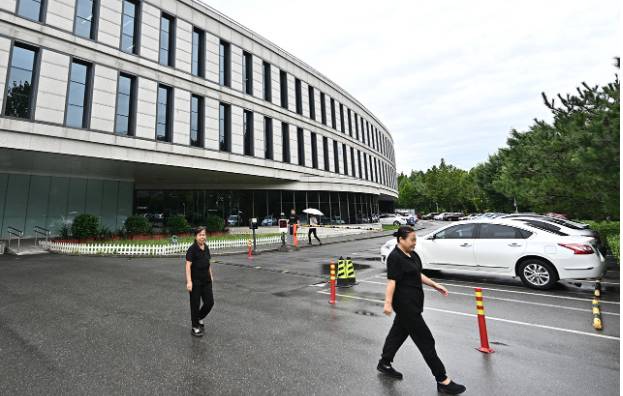Wave of developer bankruptcies in Ontario, Canada, triggers real estate market tremors
In this part of Canada, Ontario is experiencing a severe real estate crisis. This year, at least 27 developers have gone into receivership, an alarming number that has reached a multi-year peak. Experts say the surge in this number could put hundreds or thousands of housing units in limbo, putting the life savings of floorplan buyers at great risk.
Mark Morris, a lawyer with real estate firm Legalclosing.ca, lamented, “The new construction market is completely dead.” Insolvency Insider, a database that tracks the largest bankruptcies in Canada, shows that 18 developer receivership petitions were reported in Ontario in 2023, 16 in 2022, 19 in 2021 and 15 in 2020. These numbers are based on reports of large court-appointed receiverships, and court orders can be found on the receiver's website.
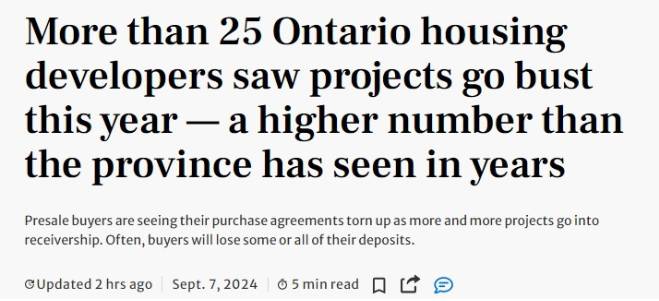
The cracks in the homebuilding industry have already begun to show over the past few years: StateView Homes collapsed in mid-2023 after defaulting on hundreds of millions of dollars in debt, leaving hundreds of homeowners stranded, and Mizrahi Developments went into receivership in October 2023, leaving the future of its 85-storey luxury tower at Yonge and Bloor streets in limbo. The One's future is in limbo.
Experts say the trend could continue for years as builders face a volatile economic environment. High construction and material costs, labour shortages and high interest rates have put many projects in jeopardy, and dozens of builders are in debt,” said Joshua Harris of Harris & Partners, a licensed bankruptcy trustee in Toronto. ‘We're seeing more and more developers and builders go into receivership,’ he said. This number will continue to grow as interest rates remain high, buyers are unable to close deals and material costs rise.” “Five years ago, buying uncompleted flats was exciting business, but now people are struggling.”
Buyers of uncompleted flats are in a great deal of trouble and, in a worse case scenario, they could end up losing their home. Recently, Harris received an unusual case. As a licensed bankruptcy trustee, his job is to help people who are struggling to pay off their debts. in June, a client approached him requesting to file for bankruptcy because she couldn't pay off a debt of $60,000. harris asked about her assets and whether she owned a property, which is usually sold to pay off debt. She said she had put a deposit on a townhome, but the house hadn't been built yet. “We investigated and found that the developer had gone into receivership,” Harris said. “That put her in trouble.” That meant she couldn't file for bankruptcy because her assets weren't technically sellable assets, and “who would buy something that was in receivership?” In fact, the client may not even be able to keep the purchase agreement.
Bryan A. Tannenbaum, a licensed bankruptcy trustee and director of TDB Restructuring, says that a buyer of a floor plan's purchase and sale agreement is often terminated during a receivership. When a builder's loan defaults, the housing project goes into receivership. The lender can then apply to the court to have the property placed in receivership, and a receiver appointed through a court order will then take over, sell or market the property “as is”, or complete the project and realize a profit and return to creditors. New purchasers often ask for a court order to terminate existing purchase and sale agreements that are no longer profitable and where deposits have been used by insolvent builders. In most cases, I would say 99% of the time, these purchase and sale agreements are unfortunately terminated,” he says. A new purchaser willing to take over the project does not want to be responsible for these contracts.”
Subsequently, the buyers of the floor plan have the right to go to Tarion, the Ontario consumer protection organization, to get a partial or full refund of their deposit, depending on whether they bought a condo or a freehold home. If a buyer signs a purchase agreement on or after Jan. 1, 2018, the deposit is protected up to $60,000 for homes with a sales price of $600,000 or less. For homes over $600,000, the amount guaranteed is 10% of the sales price, up to a maximum of $100,000 Deposits on condominiums are usually held by the builder's attorney and must be returned in full, without interest. If the builder doesn't refund it, then Tarion only offers protection up to $20,000.Tannenbaum adds, “Then the new developer re-sells the unit, but they usually ask for more money.” “At the end of the day, the floorplan buyer loses the house in this situation. That's the consequence.”
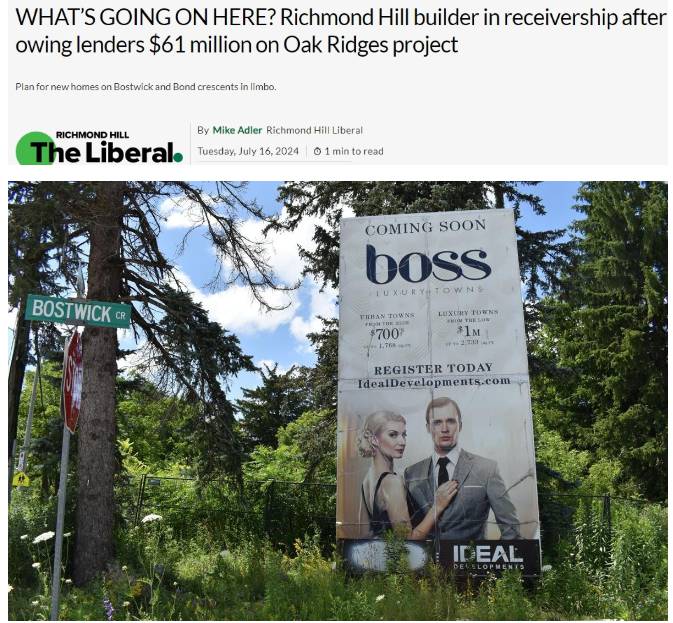
Experts point out that even if another developer buys the project, there's no guarantee that it will be completed, and sometimes ownership can change hands multiple times, so that the supply of much-needed housing can be delayed for years. One example is the 72-townhome project in the Oak Ridges neighborhood of Richmond Hill.In 2022, King Development purchased parcels 8, 10, 12, 14, 16, and 18 in Bostwick Cres and 2, 6, and 8 in Bond Cres from Ideal (BC) Developments but It was later discovered that the builder was not licensed to build or sell new homes in Ontario. The project was already delayed when King took over because Ideal (BC) Developments was not authorized to build. Shortly thereafter, King went into receivership in June owing $22.5 million to its largest creditor. The properties remain uncompleted, four years after the original buyer purchased the site.
Now, a large number of the properties are being transferred on a bloodbath. Once upon a time, Greater Toronto had hundreds of people lining up for days and nights to grab a building, but just a few years later, there is no longer a queue to grab a building, but instead, there are advertisements of blood-curdling transfers of buildings.51 There are hundreds of information on the transfer of buildings, and the messages conveyed in them are chilling. The actual fact is that the actual price of the product has been lowered by 200,000 dollars! The seller has to pay the buyer 100,000 + brokerage fee for the full loss of the seller's deposit! There are also ads that say: [300,000 deposit fully compensated transfer] without any management fee Markham End Unit townhouse blood loss transfer! There are a lot of similar advertisements, one is more miserable than the other. A real estate agent who did not want to disclose his name said that with soaring interest rates, many people have not met the loan conditions, in the face of the delivery date is approaching can only bear the pain, or if you can not complete the delivery, not only to lose the deposit, but also may be facing the developer to recover other losses, when the lawsuit is a cost, rather than delaying until then to cut the meat, as well as to stop the bleeding now.
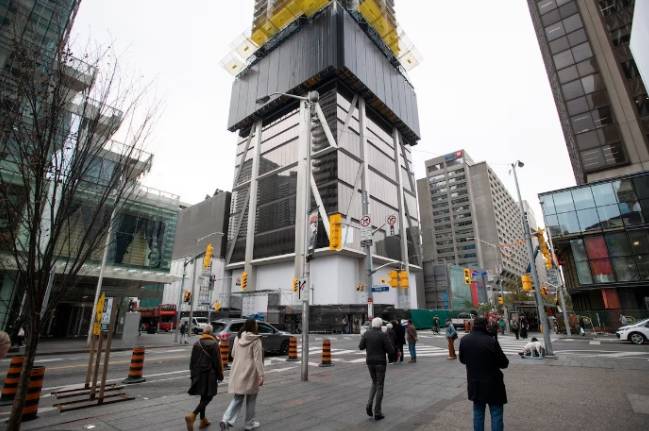
“There's a major supply gap that's developing,” says Daniel Foch, a Toronto realtor and director of economic research at RARE Real Estate. Not only because projects are changing hands from one buyer to another, but also because the presale and new construction numbers are down because the real estate environment is so tough. According to a report by real estate research firm Urbanation, the percentage of condominiums pre-sold is at a 20-plus year low of less than 50 percent. Condo projects can't start construction without at least 70 percent of pre-sales, so fewer sales have dramatically slowed the supply pipeline. More homebuyers are dropping deposits and failing to complete purchases because interest rates are much higher than they were when they agreed to buy a few years ago, said Morris, a real estate attorney, adding that there are fewer recipients of conveyancing transactions.
The current market environment suggests that developers under financial pressure will struggle to find buyers, making it easier for them to go into receivership.Foch says: “A reduction in high-rise construction over the next three to five years would be quite catastrophic.” But even if the dust settles, it's unlikely we'll be back to normal anytime soon. foch believes the most likely outcome for struggling builders will be an increase in mergers and acquisitions, with development land being absorbed by the big players. The crisis has hit Ontario's real estate market hard, and the future is fraught with uncertainty.
-------- END --------
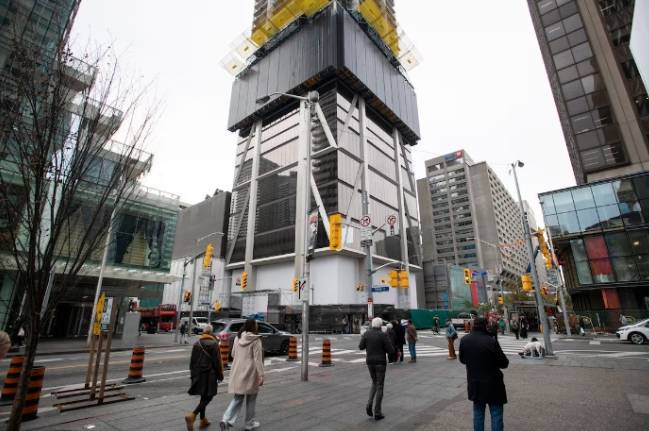
![Industry Intelligence] Record-breaking data, this year's Cologne exhibition won hemp](/images/2024/08/28/20d5f0d5bcd76a4e133c59c6145d189766ce8a26f00ee.jpg)
